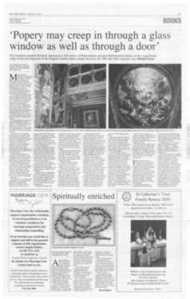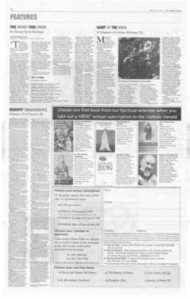Page 5, 22nd February 2008
Page 5

Report an error
Noticed an error on this page?If you've noticed an error in this article please click here to report it.
Tags
Share
Related articles
Social Encyclical Due Out By Summer
Social Encyclical Delayed By Global Financial Crisis
New Papal Encyclical Is Published Today
Pope 'to Denounce Tax Priest's Son Havens' In New Encyclical
Put God At Heart Of Economy, Says Pope
Social encyclical is due out next month
ope Benedict XVI's third encyclical is to be published i n March, most probably immediately after Easter and in a number of languages including Arabic and Chinese. According to Vatican sources, the document — the Holy Father's first social encyclical — will focus on globalisation and is divided into two parts. The first will recall the social encyclicals of two of his predecessors: Paul VI's Populorum Progressio, published 40 years ago this year, and John Paul H's Centesimus Annus, published in 1991. The second part will take a broad look at the social problems affecting humanity. Globalisation, together with issues of poverty, economic inequality, conflict over resources, the environment, disarmament, and peace will all be examined in the light of Catholic social teaching.
Unlike the Pope's two previous encyclicals, Deus Caritas Est and Spe Salvi, this one will have less of a personal touch, being the work of a number of Vatican committees made up of experts and consultants. The five-chapter encyclical, which is currently being translated from Italian into Latin, French, English, German and Spanish, as well as Arabic and Chinese, is aimed at all men and women of goodwill, particularly heads of state and governments. Most of its contents are taken from the Compendium on the Social Doctrine of the Church which, since it was published in 2005, has been translated into 38 languages. After the publication of Benedict XVI's social encyclical, the compendium will have to be updated.
It's been widely known that the Pope has been wanting to write a social encyclical for some time, which was why many were surprised when Spe Salvi was published first. But sources close to the Holy Father say he wanted to lay the groundwork for the social encyclical through Spe Salvi and Deus Caritas Est. Both documents aim, among other things, to remind the faithful of the fundamentals behind Catholic social teaching. The Holy Father was also keen that the social encyclical be published ahead of his visit to the United States in April when he is scheduled to address the United Nations in New York.
It's not clear whether the Pope has already signed the encyclical, but one date being floated for its signing or publication is March 19, the Feast of St Joseph the Worker. The next major encyclical will be on faith, the third theological virtue, and published next year. Before that, the second volume of the Pope's book Jesus of Nazareth is extiected to hit the shelves, most probably at the end of the summer. Aprominent Italian atheist and masterful debater has taken on the mantle usually confined to the. Church and is battling for a change in Italy's abortion laws. Giuliano Ferrara, the hirsute editor of Italy's neocon newspaper It Foglio, has given up his television tallcshow and decided to run as an independent pro-life candidate in Italy's forthcoming general election, slated for April 13-14.
Since December, Mr Ferrara has been using his paper as a platform to campaign for a universal moratorium on abortion after the United Nations passed a resolution calling for a moratorium on the death penalty. The former Communist argued that if the death penalty was deemed "unjust" and an offense against "human dignity", then that must logically lead to the defence of innocent life in the womb. The Italian bishops, usually a lone voice in Italy's public square, quickly endorsed the moratorium in the Italian bishops' own publication, Avvenire. Mr Ferrara, who was once a minister in Silvio Berlusconi's government, is now seen as a possible health minister should Mr Berlusconi win April's election, as polls predict. That could mean a tightening of Italy's abortion law, which currently stands at 24 weeks. The current minister, Livia Turco, joined in demonstrations last week in support of a Neapolitan mother who was interrogated by police officers after a tip-off that she had had her baby aborted later than the 24-week limit. Tests later showed the mother had the baby aborted after 21 weeks following tests showing abnormalities.
Whatever happens, the possibility of some tightening of Italy's 1981 abortion law looks more and more likely. And as the probability increases, so does the likelihood of further demonstrations in Italy. Several thousand protested in Rome, Bologna and Milan in favour of the mother from Naples, while at the same time denouncing Mr Ferrara, whom they call the "Italian Taliban". But beyond the cheap jibes. Italy is at last having some serious debate on the issue — stirred up, ironically, by a tough-talking, bearded atheist.
blog comments powered by Disqus

















